OUR RECIPE FOR SUCCESS
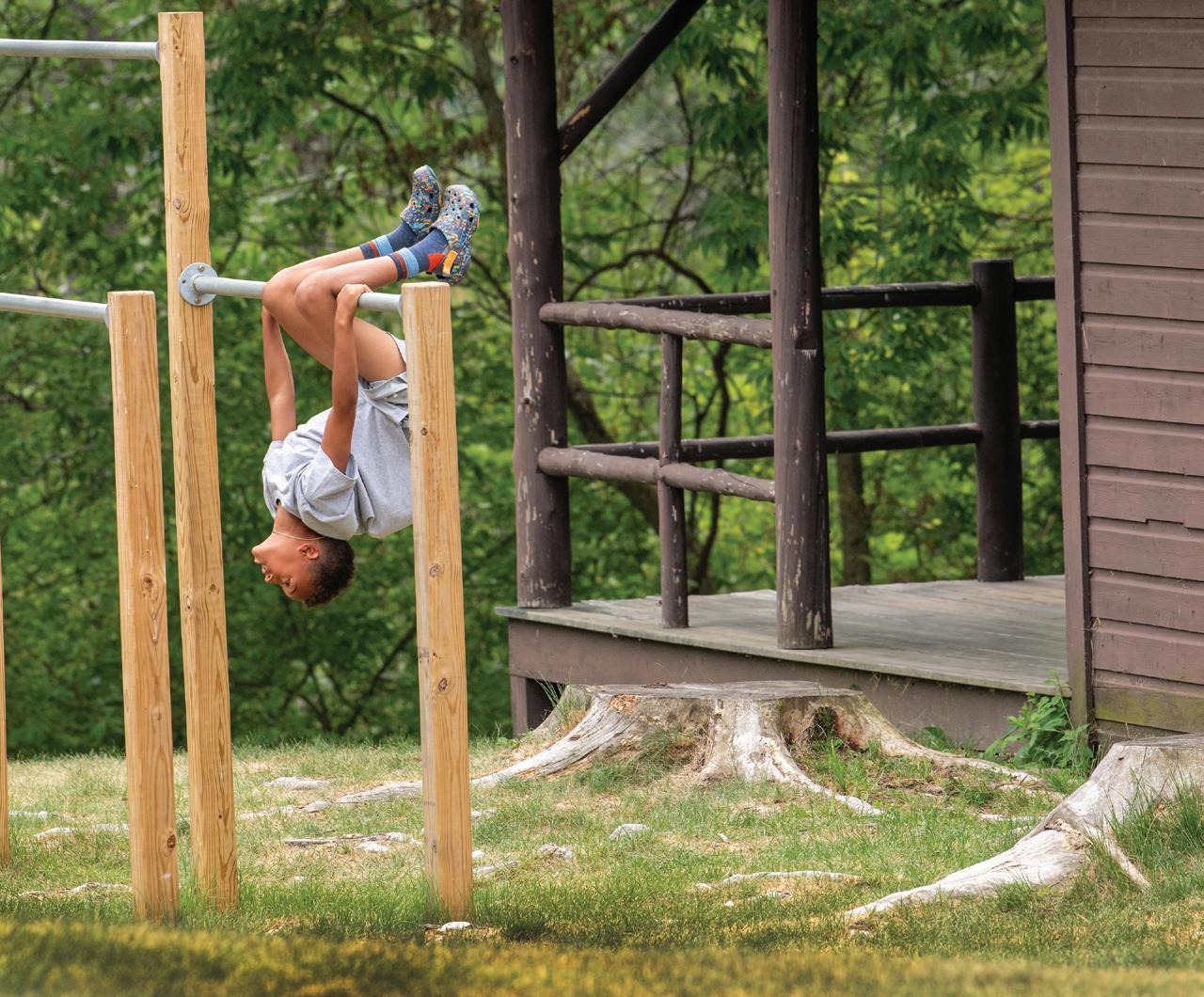


It’s a question we hear a lot and it’s a good one: “What’s your secret recipe?” Meaning, what’s at the core of Aloha Foundation camps and programs? What distinguishes them?
Here are some key points you would likely hear in our response:
First, we’d clarify that our “secret” recipe is not so secret and that’s intentional! Talking about the positive impact of camp is our passion, and whether it’s at the grocery store or on a plane to San Francisco, the opportunity presents itself more than you’d think. In fact, it’d be fair to say we spend most of our time discussing and sharing our recipe whether it’s with families, local educators, or our peers in camping nationwide.
We’d also want to point out that, by design, our recipe is flexible. Great cooks have been tweaking and refining it since the very beginning adding a dash of this or that, substituting an ingredient, experimenting with a complementary flavor, leaving the raisins out or adding in extra. It travels well, and can easily be doubled.
In our recipe for success, there are five essential ingredients: a belief that personal growth is at the center of our camps and programs, a commitment to excellence, outstanding staff, a strong network of supporters, and a beautiful environment where it all happens.
Continued on page 4 ...
Dear Aloha Family,
Every year as the calendar counts down, there are some clear markers that tell me camp is just around the corner. Take the recent delivery of 500 black watch plaid flannel shirts for our uniform rental rooms. Or even more noteworthy for getting in the camp spirit was the weekend I spent with our Board of Trustees at Ohana Family Camp for their annual spring meeting. One Board member told me that if he had to pick one word to describe those few days together, it would be ENERGY.
But perhaps my favorite annual reminder that camp is almost here happened the other day when I was hiking in the Hive woods with our family’s dog, Gracie, a happy and insatiable explorer. About 20 minutes down the trail, she bounded in front of me and in a single leap disappeared into a thicket of bushes.
I stopped to soak in the lush landscape of buds, newly sprouted leaves, and the carpet of moss. Brilliant shades of green surrounded me: pine, emerald, juniper, hunter, apple, sage. Just as quickly as she had vanished, there was Gracie, jumping out through a bunch of ferns and emerging seemingly out of nowhere.
Vanessa Mendillo Riegler, Executive Director
I remembered that a few months back on this walk, the trees were mostly bare and I could see every move Gracie made. There was no spontaneous game of hide and seek. I watched her trot along and stop every so often to sniff something interesting. It was reassuring to be able to keep my eye on her.
Yet, there was no mistaking it: Gracie exploring on her own in the forest gave us both joy. I knew she was safe and we trusted each other to wander a bit, knowing we could reconnect at any time.
We continued down the trail and I thought about our campers who do the same thing: run excitedly ahead of their counselors as they scout out a new route or activity, and take independent steps forward. Even though we know they’re a few feet from us, for a fleeting moment, they feel far away.
As parents and caregivers, we’re familiar with the push and pull of raising kids the tension between holding on and letting go. The comfortable and the uncomfortable. At one point or another, most of us have thought, “Can’t they just live at home forever so we wouldn’t have to worry?”
What we know from camp is that the real beauty and wonder for our children and for us is found in letting go.

Each spring, the leaves on our properties fill in and fill out in all shades of green, readying our campuses for adventure and creating little spaces, pockets of independence where learning and growth, curiosity, and even courage can flourish.
Let’s embrace it together.
Vanessa Mendillo Riegler Executive Director vriegler@alohafoundation.org
Summer 2023 Reveille: Jenn Merritt, Director of Communications; Holly Fisher, Designer; Jenn Grossman Wheeler, 2022 Director of Photography and Camp Photographers. Email jmerritt@alohafoundation.org with story ideas, suggestions, or feedback.
Servings:
About 10,000 people per year
Prep time:
118 years and counting
Level: Advanced
Ingredients:
• A central belief in personal growth
• A commitment to excellence
• A team of exceptional, highly trained staff
• A generous network of supporters
• A special sense of place
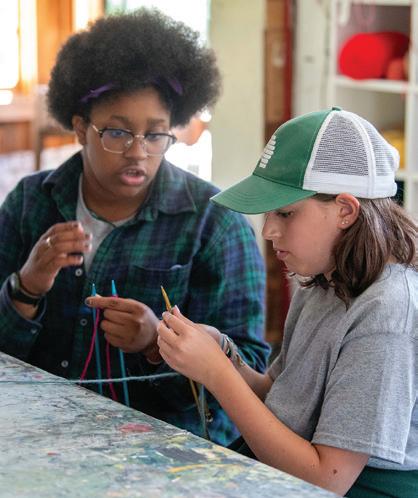
We believe camp is more than archery, canoeing, and the activities you do. A great camp experience teaches lifelong skills about building community and supporting others, and challenges us to become the best versions of ourselves. For one camper, personal growth may mean trying hiking for the first time and tackling an overnight trip. For another, it might be leading a group activity or mastering a new skill.
One of the distinguishing characteristics that supports our philosophy about personal growth is the Success Counseling framework. Consistent across all Aloha Foundation programs, it allows staff to build their skills over time. We introduce campers and counselors-in-training to basic Success Counseling concepts and teach more advanced principles as they gain experience.
For a specific example, read the short Success Counseling scenario on page 5.
One of the ways we demonstrate our commitment to excellence is through the accreditation of all six of our camps and programs by the American Camp Association (ACA). Accreditation must be renewed every five years and requires a significant amount of time and commitment. Each program must meet up to 300 specific standards in categories such as health and wellness, staff supervision, program design, and facilities. Fewer than 20% of the 14,000 resident and day camps in the U.S. hold ACA accreditation.
In addition, we continually re-examine virtually all elements of our programs through the lens of our values and philosophy. Every aspect of our work is intentional—from the activities we offer, to the number of participants and staff enrolled in each program, to how we match campers and counselors in tent families. There’s even careful thought behind details that seem small, like camper name tags or how we serve food at a dining table. Continuous assessment and improvement are a crucial part of our work.
The Aloha Foundation’s diverse seasonal staff, who range in age from 18-77, bring with them their own wonderful array of personalities, talents, and backgrounds to share. They are college students, teachers, graduate students, professionals, parents, and retirees. At camp, we like to say we make our own fun, and our staff excel at this. Creative and enthusiastic, they are experts at adapting or pivoting when weather or other obstacles arise.
Before camp begins, counselors participate in a mandatory weeklong training. It is rigorous, thoughtfully planned and executed, and coordinated across all five of our summer programs (Aloha, Hive, Horizons, Lanakila, Ohana). Each camp’s staff forms a cohesive team—with a shared approach and goals—that becomes even stronger over the course of the summer. A few training topics during precamp include:
• Concept of a child’s world
• Developmental milestones
• Goal setting with campers
• Tent family agreements
• Teaching technical skills
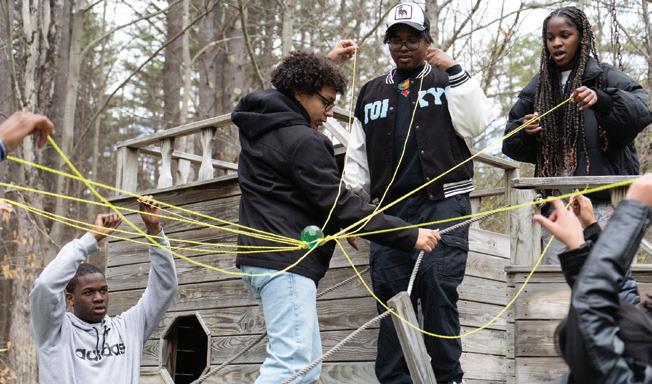
Aloha Foundation community members have helped secure the organization’s future by giving to our endowment and Annual Fund that supports camperships, staff training, facilities, and more. This longstanding tradition of community support continues today when alumni and friends enroll in our programs, make donations to the Annual Fund and special projects, attend events like the Lanakila Reunion this summer, refer new campers and counselors, host a gathering at their home for prospective camp families, or serve as enthusiastic ambassadors for all things Aloha.
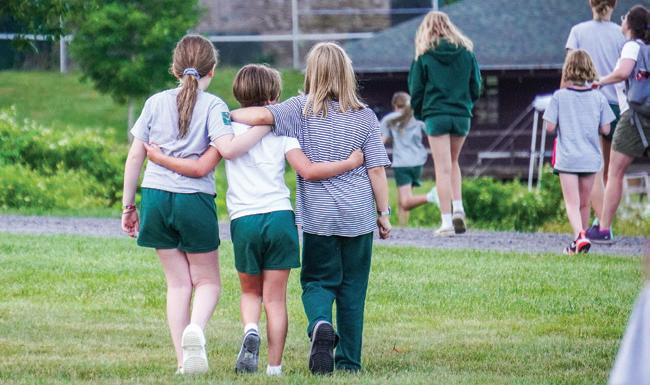
When alumni reflect on their time at camp, they inevitably mention the beauty of Vermont, the Green Mountains, and our campuses on the shores of Lake Morey and Lake Fairlee. Even years later, the mere scent of pine or sound of crickets chirping, or a loon’s call can evoke fond memories of camp. Caring for our five campuses and 1,300 acres requires careful planning and strategy and a team of dedicated yearround and seasonal staff members and community partners.
For many of us, whether our hometowns are urban or rural, camp is the longest and most immersive experience we’ll have in nature in our lifetimes. Stepping away from technology and embracing rustic simplicity allows us to focus on relationships, connection, and community.
What is Success Counseling? This framework helps us better understand what motivates people and empowers us to make better choices. Let’s walk through an example:
Let’s say you’re a counselor supervising campers playing a group game. Over time, you notice Riley is not following the rules and other campers are getting annoyed. After about 10 minutes, Riley throws the basketball over the fence in frustration and stomps off angrily to sit on the grass.
One approach in this situation might be to tell Riley that they must follow the rules or else they will need to sit out. In this scenario, while the immediate problem may be “solved,” Riley remains angry, sad, or misunderstood, and is excluded from the group. In addition, the counselor does not learn more about Riley or have a plan for when it happens again (which it likely will).
In contrast, using a Success Counseling approach, a counselor might opt to have a conversation with Riley one-on-one to better understand the motivations at play. Within this approach, the counselor might:
1. Ask what Riley wants in this situation (a response could be to score more points)
2. Ask what Riley is doing now to get that (shooting a lot, not passing to teammates) and how it’s working (not well, as other teammates do not want to give Riley the ball in return)
3. Ask if Riley can think of a couple of alternative ways to move toward scoring more points or wants any help brainstorming ideas (Riley suggests practicing more in between games, asking for some coaching help from a counselor or fellow camper, passing more and demonstrating stronger teamwork skills)
4. Ask if Riley would like help trying any of these ideas or wants to manage it alone, and ask if Riley thinks any apologies are necessary
5. Set a time to check back in with Riley the following afternoon to see how it’s going so far
The steps above might take a bit longer than the first approach, say, 10 minutes of conversation with Riley and then following up. The result, however, is geared toward long-term success rather than a short-term “quick fix” solution. This leads to more support and growth for Riley, a more positive interaction for everyone involved, and a plan for the future. A win-win-win.
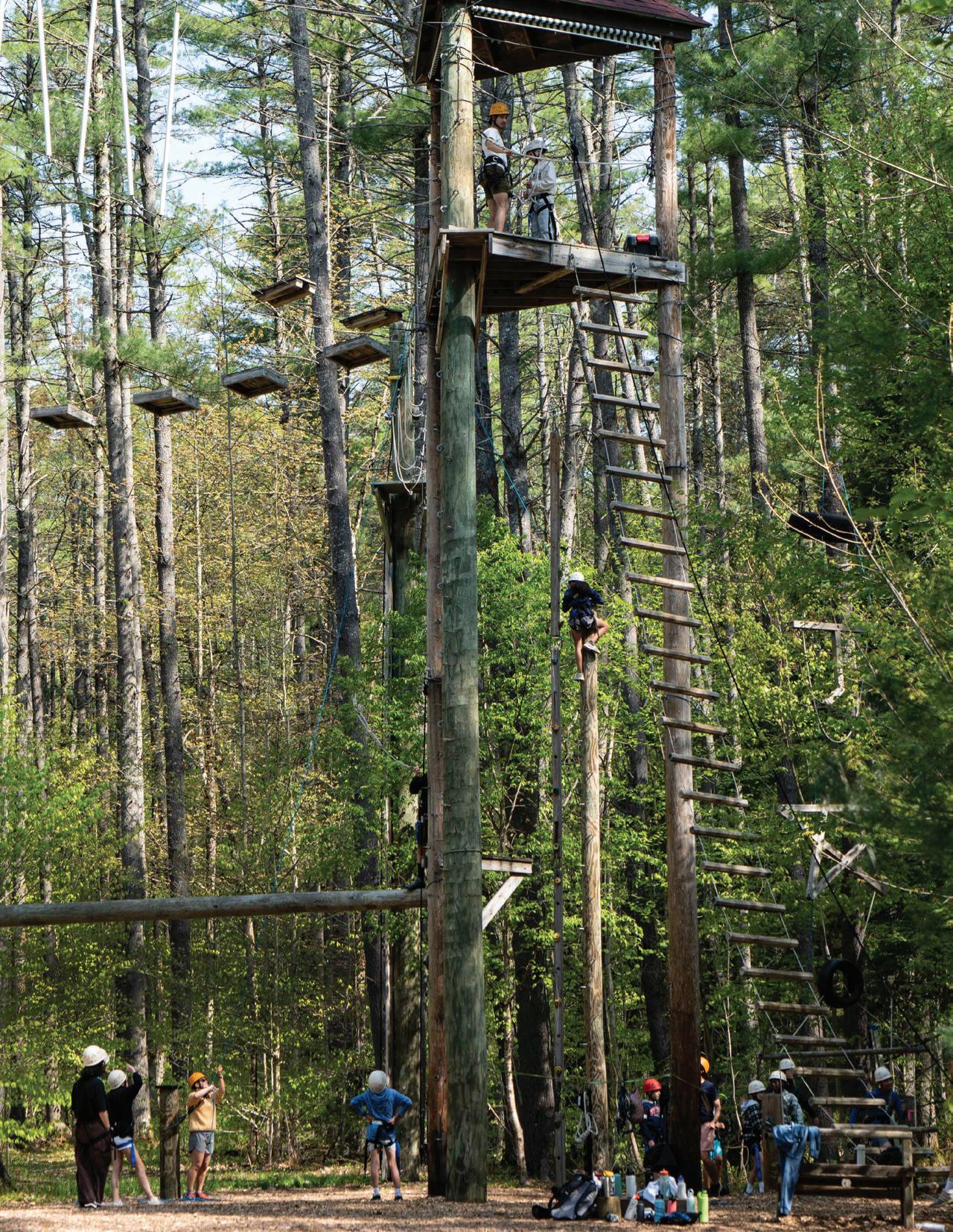
In May, about 50 students from Shore Country Day School in Massachusetts came to the Hulbert Outdoor Center for a three-day program to enhance kindness and camaraderie, challenge themselves, expand their comfort zones, and recognize and encourage leadership development.

“Our family has attended the Aloha camps for multiple generations, and we are proud to continue supporting them today. The lessons learned and memories made last a lifetime and are priceless.”
Charlotte Shahid Lanakila parent
Former Hive/Aloha camper
The Aloha Annual Fund, is a critical component of the Aloha Foundation’s strength and vitality. Comprised of gifts from parents, alumni, and friends, the Annual Fund supports the entirety of our mission.
When you make your gift online or by mail, you may choose to support one of these areas of focus:
• Aloha’s Immediate Priorities
• Campership (Financial Aid)
• Equity & Community
• Campus Stewardship
• Staff Training
In 2022, 676 people contributed gifts of every size, from $50 to more than $10,000.
Every single gift makes a difference!
alohafoundation.org/annual-fund
THANK YOU!
Contribute to the Main House Renovation Project in honor of the Lanakila Reunion in August 2023.
Each summer, the entire Lanakila community comes together in the dining room three times a day to share family-style meals and make personal connections. Amidst the buzz of conversation and laughter, the dining room is a place where campers and counselors recount stories of camp adventures, find inspiration from peers and mentors, listen and feel heard.
The enhancements which will also benefit year-round Hulbert participants will include an extension of the Old Stage dining area, refurbishment of the Counselor space above the dining room, updates to the Costume Room and Rental Clothing space, and a fully roofed fire escape in the rear of the building, providing egress from the upstairs Counselor space or “Old Shop.”
For more information, visit: alohafoundation.org/Lanakila-reunion-2023

Stuart Fairbairn (Horizons Day Camp Director, former Lanakila counselor and Hulbert instructor) and Spencer Fairbairn welcomed Wilfred John Fairbairn to their family on March 13. He is pictured with older brother Rowan.

Kelsey Hatch (former Hive/Aloha camper) and Quinn Self welcomed their daughter Rowan Adelaide Hatch-Self on October 11.

Jenn Grossman Wheeler (former Lanakila counselor and Aloha Foundation photographer) and Bleecker Wheeler (former Lanakila camper/counselor) welcomed their son Gideon Bennett Wheeler on December 12. He is pictured with his older sister, three-year-old Pilot.

Elliot Rowan Gerrity was born on April 17 to proud parents Tommy Gerrity (former Lanakila camper/counselor) and Sophie Novack.
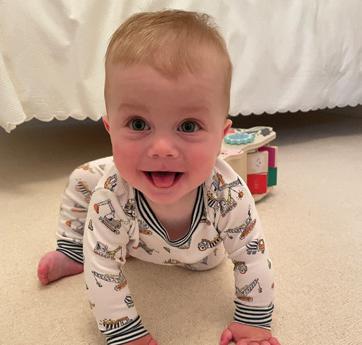
George Douglas Prill was born to Katherine Prill and Derek Prill (former Lanakila camper/ counselor) on August 4. Older brother is Charlie Prill, who is now 2 ½ years old.

Proud grandmother Mary Combs (former Aloha camper/counselor) visited her first grandchild, Violet Moon Williamson, earlier this year and sang through most of the camp songbook. Mom is Ann Combs Williamson (former Aloha camper).

Edward William Benjamin Gibbons (Teddy) was born in Blackpool UK on August 4, 2022. Very proud Mums Laura “Gibbo” Gibbons (former Aloha counselor) and Emma Pumphrey (former Aloha counselor) and big sister Tia can’t wait to introduce Teddy to the shores of Lake Morey.
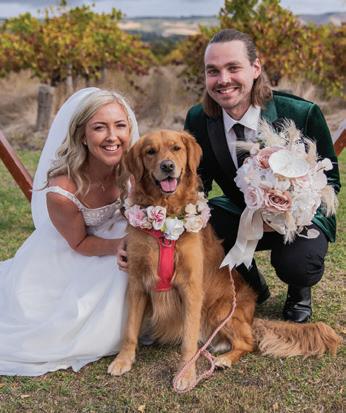
Kaelia Cockington (former Lanakila counselor and Hulbert instructor) and Jarrod Skeates were married on March 31, 2023 in South Australia. Maggie, the couple’s dog, had the honor of serving as ring bearer. Guests from camp included Sara Liptrot, Tori Sumner, Ross Cannon, Alex Lipoff, Oliver Paul, Catherine Bleakley, and Teagan Littler-Reid

Lanakila campers and counselors share stories, music, and reflections at their Sunday gathering.
Joan Meyer Capriotti (former Hive/Aloha camper) from Delaware wrote in during #AlohaGivingTuesday to report she had been at the Lake Morey Resort for a golf weekend and stopped by camp. “My sister Beth and I walked around, found my name on the boards (in 1960s) as well as our younger sister Anne Meyer Matunas Peck (former Aloha counselor) and cousin Marcia Hunkins (former Hive/Aloha camper and Hive counselor). What a blessing to visit!”
For Thanksgiving 2022, Bob Dickie (former Trustee, Lanakila camper/counselor, and Aloha counselor) and his sisters Flora (former Aloha camper) and Jane (former Hive camper and Aloha camper/counselor) gathered children and grandchildren in an Airbnb north of San Francisco. Tommy Dickie (current Lanakila counselor and former Lanakila camper) was the Funcle (fun uncle) for the two preschoolers of Amy Dickie (former Hive/Aloha camper and Aloha counselor), Eva Regnier’s (former Hive camper/ counselor) two in double digits, and Caroline McGregor’s (former Hive/Aloha camper and Aloha counselor) eight-year-old. Also in attendance was Kevin McGregor (former Lanakila camper) and his wife Monika. Lots of great family time!
In May, Kate Shockey Lafrance (Trustee Emerita, former Hive/Aloha camper and Hive counselor), Posie Taylor (former Hive/Aloha camper/counselor, former Hive Director and Aloha Foundation Executive Director), and Mary Kohring Highberger (Trustee Emerita, former Hive/Aloha camper and Hive counselor) met up for lunch and laughter in Asheville, NC. All are in (or almost in) their 80s and feeling great! (Photo at right)
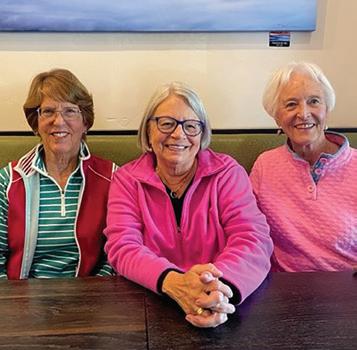
Sandy Bridger Kunze (former Aloha counselor) wrote, “I was an Aloha counselor in 1981. Responsible for the table runners in the dining hall. It was a wonderful experience. I retired from nursing in 2020. I now have five grandkids under the age of four. I spend my time making quilts and with my family. Life is good. Best to all!”
Andy Petersen (former Lanakila counselor, Aloha Foundation staff, and Ohana staff member) wrote, “Sharon and I have now lived in West Fairlee for 40 years. I’ve been associated with the camps since 1954 and Sharon since 1980. It has been a wonderful journey! Looking forward to Lanakila’s Reunion.” Sharon is a former Hive counselor.
Do you (or your children) have a new email or mailing address? Let us know so we can stay in touch. In spite of our best efforts, we have many outdated addresses in our database, and we need your help! Send your updated contact information to Cheryl Olson: colson@alohafoundation.org.

Rick Frey, Ohana Camp Director
If you do a quick Google search, you will find there are over 7,000 overnight camps in the United States. Most of those camps are for children. Sleep-away summer camps help kids gain independence, build confidence, learn new skills, and most importantly, have the time of their lives.
Many children’s resident camps offer a week or two of “family camp,” but there are far fewer programs devoted to the mission of operating a family camp exclusively. Family camps are unique and offer a chance for families to spend precious time together without the distractions of the outside world. There are no cell phones, computers, televisions, business trips, evening sports practices, or the constant barrage of media intrusions.
Many family camps are in remote areas and allow campers of all ages to live outdoors and learn about the natural world a rarity for most families nowadays. More specifically, at Ohana (our name literally means “family” in Hawaiian), family campers explore one of the most beautiful lakes in Vermont, learn about the native plants and animals in the region, create beautiful art pieces, and play games together. And no camp would be complete without cookouts, campfires, s’mores, singing, and dancing. There is something for everyone. It goes without saying that all these activities abound at camps for children, but they take on a new significance when families, groups of friends, extended families, or possibly colleagues can participate in them together it encourages opportunities for growth and problem solving, trusting one another in a different setting, and smiling, laughing, and supporting one another in the most genuine and sincere way!
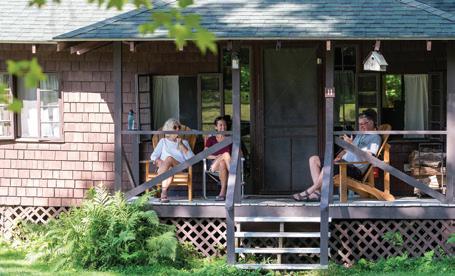
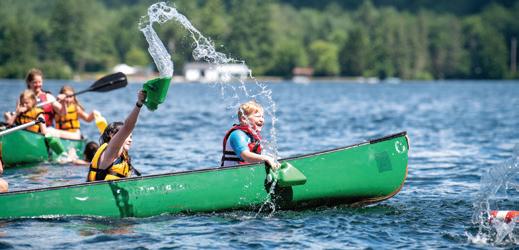
Top five reasons family camp will be the best vacation you and your family could ever embark on!
5. You’ll spend a whole week without checking your electronic devices!
4. You’ll share three meals a day with your family without distractions, and you won’t even have to cook a thing (or clean up the kitchen)!
3. You’ll experience much of the magic and traditions of the Aloha camps that stretch back over a hundred years and whose mission is to foster a transformational experience for all campers, young and old.
2. You’ll have the opportunity to swim, practice archery or yoga, canoe (bailer battles, anyone?), read on the porch, make a project woodworking, try the ropes course, sail, paddleboard, play capture the flag and that’s only a partial list!
And drum roll, please…
1. You and your family will spend a precious week together learning, laughing, and marveling in the absolute wonder of the natural world that will surround you day and night. You might even fall asleep and wake up to the calls of our resident loons on Lake Fairlee!

We still have a few spots available this summer. Contact Rick for more information: rfrey@alohafoundation.org
Online registration for summer 2024 opens in August! alohafoundation.org/ohana
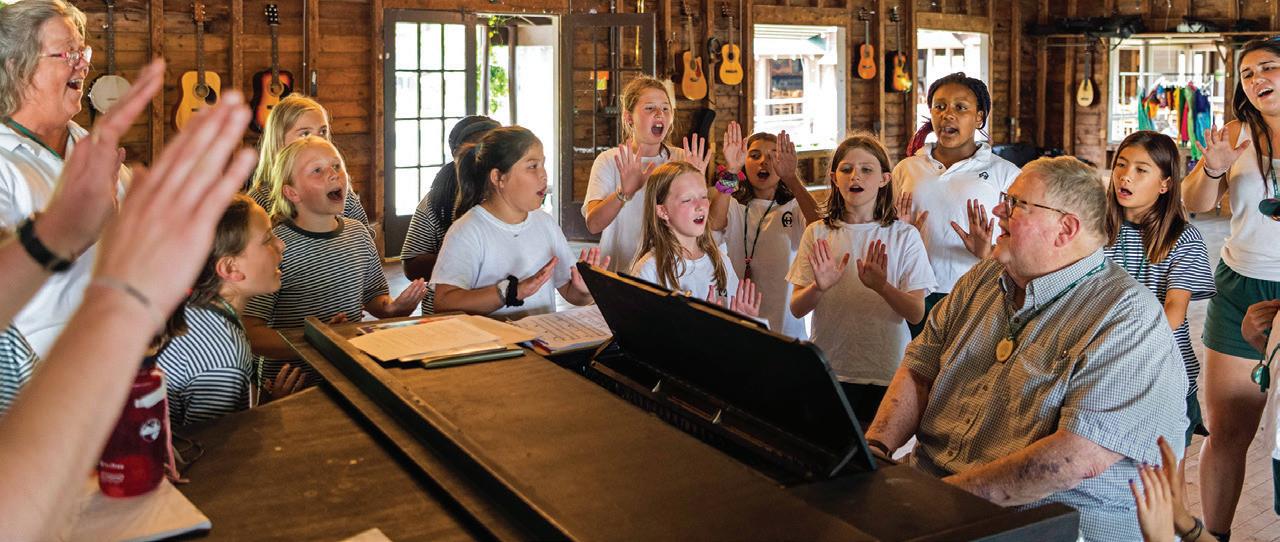
My father, Biff Fink, musician, songwriter, and educator spent summers during the 1970s and early 1980s teaching music and drama at Aloha and Hive, and was a guest in Performing Arts in the years since. He credited much of his songwriting inspiration throughout his life to his time at the Alohas.
Biff wrote the following piece in March 2021 as part of a memoir class. I hope you will recognize in it the camp themes I did from the uncertainty and doubt we can feel as campers, counselors, or professionals, to the gifts of a growth mindset, choosing curiosity, and acceptance of ourselves and others. A lover of words and language in all forms, he is best honored with his own.
Jenny (Fink) Merritt Communications Director
Former Hive and Aloha camper Hive counselor, and parent
Biff’s obituary can be found here: tinyurl.com/45umt9cv
In honor of his love of camp, music, and teaching, his family chose the Aloha Foundation as the recipient of gifts in his memory.
By Biff Fink
It all started in 5th grade math. My parents thought school was too easy for me. And maybe it was—I had been floating along at the top of the class. Life was good. A’s seemed to be my natural habitat.
So in October they had Miss Fisher, our principal, bump me up into the 5th grade. I took an empty seat halfway back in the row nearest the long cork bulletin boards. Miss Fisher murmured a few words to Mrs. Snow and left.
The bulletin board next to my desk showed each student’s progress in math. Following each name was a row of orange rectangles indicating successful completion of a math unit. Some had long tongues of orange stretching across the white expanse of ignorance, while an unfortunate few had almost nothing.
Mrs. Snow inked in “Biff Fink” at the bottom of the list. The long white vacancy next to my name was demoralizing: This kid knows nothing, and the gap is insurmountable.
The complex diagrams of long division on the blackboard were totally bewildering. Mrs. Snow introduced the New Student to a wall of stares, and my confidence zeroed out.
The story I’ve been telling myself is that this moment was when I first felt a hollow chasm in my chest. I was lacking some core quality that all the other students had. Where their inner voice said “Here I am,” mine said, “No one home.”
Despite decent grades this feeling of inadequacy followed me through junior high and high school. It followed me to college, into the Army and into professional life as a teacher and composer. Other students knew more. Other officers had greater leadership skills. Other teachers had better control of their class. Other songwriters had magical skills. I never quite measured up.
So I took a second undergraduate and Master’s degree, read everything I could get my hands on, took professional courses every summer, and became an inveterate internet researcher, always pursuing, never knowing enough.
This invidious comparison became habitual. You could even label it Envy, a deadly sin. Or you might just say it was unquenchable curiosity about almost everything. Whatever you call it, it wore me out.
But now, near the end of my career, I’ve grown more accepting of myself. I know how hard I’ve struggled and far I’ve come. I’ve been recognized as a refreshing and creative teacher. I’ve written dozens of songs that are still sung in schools and summer camps. I’ve landed a song on a country album that sold six million copies. I’ve enjoyed a life of teaching, composing music, and directing choirs.
Now I see my life as a constant journey of discovery, a faithful quest for artistic excellence. I understand now that the pure ideals of art elude even the greatest of practitioners. Pursuit is the thing. As the ancients had it, “Ars longa, vita brevis” “Craft is long, life is short.”
Sometime soon I may even re-visit long division.
2968
Ohana Family Camp Season
June 18 – August 17
Aloha, Hive, and Lanakila Camp Season
June 23 – August 9
Horizons Day Camp Season
June 26 – August 11
Aloha, Hive, and Lanakila Visiting Weekend
July 15 – 16
Lanakila Reunion
August 11 – 13
Hulbert August Family Camp
August 13 – 19
Hulbert New Year’s Family Camp
December 27 – January 1, 2024
